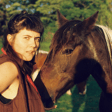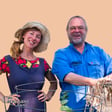
Birthing Rites with Eleanor Young
What's the story with free birthing, wild birthing, orgasmic births and births that don't go to plan?
Here to deliver answers to all our laborious questions is the wise and erudite Eleanor Young, researcher, permaculturalist, writer and midwife.
Even if you're not some born-again birthing evangelist, you'll find lots to love in this gentle and soulful exploration of human propagation. Because there is so much overlap between how we treat birth and how we treat the earth; between reclaiming our mammalian birthing blueprint and remembering how to live within nature’s lore and loamy bosom.
I love that Eleanor integrates permaculture principles and midwifery. I love that she walks between worlds, the clinical and the feral. And you’ll love this episode if you’re yearning to learn about undisturbed birth, the current state of midwifery, polyvagal theory, healing birth trauma and why permaculture principles and birthing are natural bedfellows.
LINKY POOS 🧙🏼♀️
Eleanor’s substack ~ Inhabiting the Edge
Donut Economics ~ Kate Raworth



















